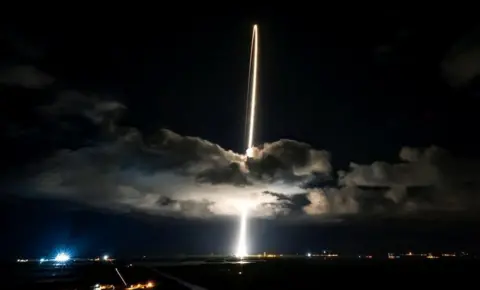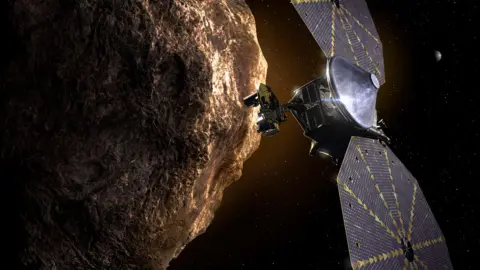Nasa mission's out of this world for PhD student
A few years ago, Duncan Lyster was studying physics at school in a market town in rural Herefordshire.
Today, he is in the US, working on a Nasa mission to uncover the ancient secrets of the solar system.
"It's really cool," summed up Mr Lyster, from Ross-on-Wye.
He got the opportunity to spend three weeks working with the space agency as part of his PhD in planetary sciences at the University of Oxford.
 Reuters
ReutersNasa launched the Lucy probe in October 2021 as part of a $980m (£720m), 12-year mission to study Jupiter's trojans - groups of asteroids surrounding the solar system's largest planet.
Mr Lyster said they date back to the very earliest days of the solar system.
"The mission is actually named after the Lucy fossil, which is the first fossil discovered of an upright, walking human," he explained. "That taught us a lot about early humans, and the aim of this mission is to learn about the early solar system and how the solar system formed."
My Lyster admitted to being a little star-struck by some of the people he was working with.
 Getty/Ed Perlstein
Getty/Ed Perlstein"There's some really big names in science here," he said. "I met a guy who basically, everything I've been doing for the last year and a half of my PhD is based on work that he did back in the 80s."
He also found himself working alongside Queen guitarist Brian May - who famously finished his own doctorate in astronomy nearly four decades after he began - which Mr Lyster described as "a bit of a surprise".
Mr Lyster, whose fascination with space began in early childhood, said he was still amazed by the science behind launching probes into space.
"You're aiming at this tiny point of light, which you can only see with the most powerful telescopes.
"This is a spacecraft that's moving at 30,000mph relative to the asteroids. To be able to predict that with that level of precision - I still find it absolutely mind-boggling. Then we get these images back, and we get to have our first ever close-up look at this new asteroid that no one's ever seen before.
"It was a pretty special moment."
 Nasa via PA
Nasa via PAA former student at Ross-on-Wye's John Kyrle High School - where he paid tribute to "Mr Toomer, a fantastic physics teacher" - Mr Lyster is already a long way from home.
So can he see himself going even further, following in some famous footsteps and taking a trip to space?
"If anyone's going to offer me a ride, I certainly won't say no."
And what of the age-old question - is there intelligent life out there?
"The universe is so big, there are so many star systems, and we now know that almost every star we see in the sky has a planet or multiple planets orbiting it. I think it is overwhelmingly likely that there's something out there. Whether we'll ever see it or make contact with it is another question.
"But I think there's something out there."
Follow BBC Hereford & Worcester on BBC Sounds, Facebook, X and Instagram.
